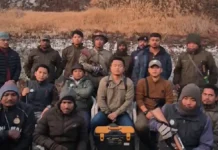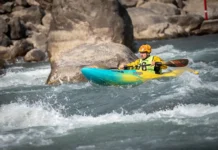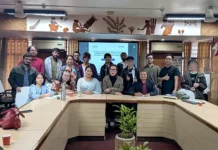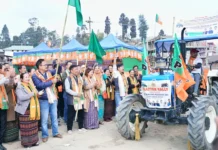DARAK, 18 Oct: Mindak Karcho and Kipek Gamlin Boje were the winners of the angling competition in the men’s and the women’s category, respectively, at the 4th Darak Ecotourism-Cum-Angling Festival, which concluded here in West Siang district recently.
The winners were awarded cash prizes of Rs 1 lakh each, along with trophies and certificates.
In the men’s category, Bomji Kamchi and Dorzon Mugli secured the second and the third prize, respectively, while in the women’s category, Gesum Raksap Boje and Ngai Bogo Likar secured the second and the third position, respectively. The second and the third position winners in both categories received cash prize of Rs 50,000 and Rs30,000, respectively, along with trophies and certificates.
Prizes were also awarded for the highest and the fastest catchers.
In the men’s category, Narmi Taga and Nyadi Kadu won the prizes for the highest and the fastest catcher, respectively. In the women’s section, Anamika Singhi Mugli and Karter Bogo bagged the prize for the fastest and highest catcher, respectively. All winners received cash prizes, trophies and certificates.
Senbom Potom and Ngade Raksap received consolation prizes, consisting of cash prizes and certificates.
According to Jummo Potom, general secretary of the 4th Darak Ecotourism-Cum-Angling Festival, a total of 86 anglers – 64 men and 22 women – participated in the competition. Notably, this year’s participation was five times higher than the previous edition, with sport anglers from various states enthusiastically participating in it, he said.
The main objectives of the event were to promote
sustainable conservation of fish species and other aquatic animals through awareness and regulated angling activities, generate income for the locals, and showcase Darak as a potential destination for eco and adventure tourism.
The angling tournament spots, the Sibu and the Siik rivers, are home to a rich variety of fish species.
According to angling experts, three species commonly found in these rivers are the golden mahseer, known as the ‘King of the Himalayas’, chocolate mahseer, and copper mahseer.
Among these three species, anglers prefer the golden mahseer due to its challenging and sporty nature, which demands skill and endurance to land. The other two species are relatively easier to catch.
Apart from the angling competition, a three-hour trekking programme was introduced as a pilot project for non-anglers and visiting tourists, highlighting the ecotourism aspect of the festival. The trek covered the dense mountain periphery connecting the three villages of Darak circle – Poyom, Bogo, and Potom. The trek started from the Soe area of Poyom village and culminated at the Penru cave near Larmuk (Potom village), passing through the Pegi Yorlo Eco-Camp near Bogo village.
The trekking route was not artificially developed but rather a rediscovered heritage trail once used in the olden days. Along the way, participants engaged in various ecotourism-based activities, such as bird watching, exploration of the majestic Ruku waterfall, and a visit to Mishing Dego Onam, a historic migratory route of the Mishing community, now residing in the plains of Assam.
The trek also included visits to Kebo Lipik, a natural stone shelter, and a recreational rope swing at Gense Putu, adding both adventure and cultural depth to the trekking experience.
The trekkers were provided with complimentary trekking T-shirts, trekking experience certificates, guide books on Darak tourism, and an opportunity for complimentary fishing/angling at the natural fish sanctuary in the Sibu river at Deyi Farm, a site developed by progressive farmer Beyi Potom.
During the valedictory function, Nyakar Raksap emphasized the need for conserving fish and aquatic biodiversity, and urged the public to refrain from illegal fishing practices such as blasting, poisoning, and electric fishing.
Advocate Kali Bogo highlighted Darak’s rich flora and fauna and emphasized its significance in promoting the Darak Ecotourism-cum-Angling Festival to attract more anglers and tourists to the region. He also underscored the importance of strengthening the hospitality sector, including homestays, transportation, proper information dissemination, and public awareness.




